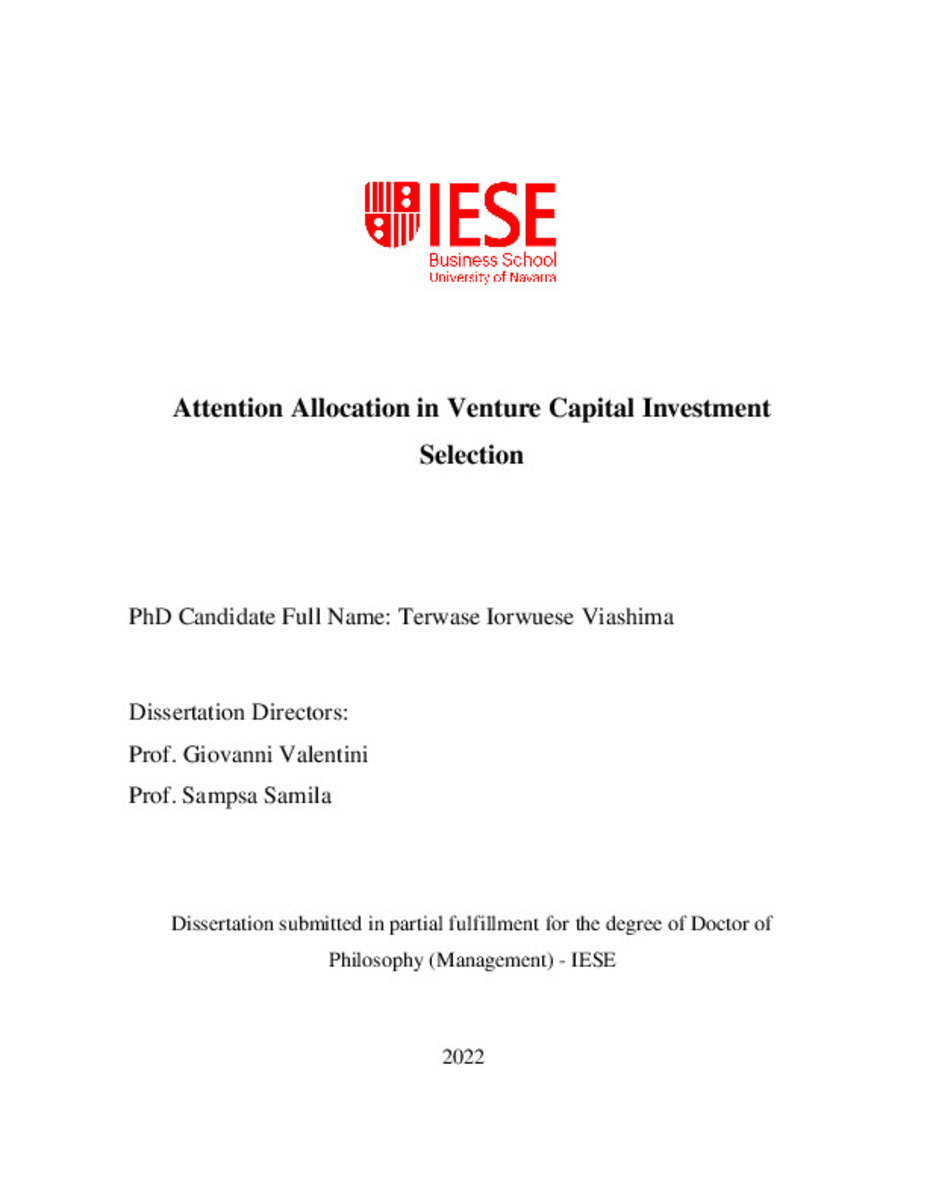Full metadata record
| DC Field | Value | Language |
|---|---|---|
| dc.contributor.advisor | Valentini, G. (Giovanni) | - |
| dc.contributor.advisor | Samila, S. (Sampsa) | - |
| dc.creator | Viashima, T.I. (Terwase Iorwuese) | - |
| dc.date.accessioned | 2023-03-27T10:13:05Z | - |
| dc.date.available | 2023-03-27T10:13:05Z | - |
| dc.date.issued | 2023-03-27 | - |
| dc.date.submitted | 2022-07-06 | - |
| dc.identifier.citation | VIASHIMA, Terwase Iorwuese. "Attention allocation in venture capital investment selection". Valentini, G. y Sampsa, S. (dirs.). Tesis doctoral. IESE Business School, Barcelona, 2022 | es_ES |
| dc.identifier.uri | https://hdl.handle.net/10171/65797 | - |
| dc.description.abstract | This dissertation uses verbal interactions between investment-seeking entrepreneurs and VC investors to uncover how variation in attention allocation by VC investors during venture screening influences venture funding decisions. Chapter 1 focuses on gender and investigates if VC investors evaluate male entrepreneurs differently from female entrepreneurs. The results show that female VCs appear to pay up to 23% more attention to entrepreneur / team criteria when evaluating female entrepreneurs than male VCs screening male entrepreneurs. This effect is explained by product gender orientation where female investors appear to favor female entrepreneurs whose ventures offer female-oriented products. Chapter 2 focuses on ethnicity and investigates if shared ethnicity between a VC investor and an entrepreneur influences the investor's assessment of the investment potential of the venture. The results provide evidence that co-ethnicity increases the likelihood of promotion-focused feedback from investors by up to 74%. However, rather than being systematically widespread among investors, this effect is limited to ethnic minority investors and entrepreneurs, who are severely under-represented in US VC and high-growth entrepreneurship. Chapter 3 focuses on personality factors and investigates the relationship between the Five Factor Model (FFM) personality traits verbally promoted by an entrepreneur and subsequent venture financing outcomes. The results suggest that entrepreneurs who communicate higher levels of extraversion via language are 13.5% more likely to receive venture funding, provided their ventures meet certain baseline quality standards. The results also provide evidence that investors perceive extraversion as a desirable entrepreneurial trait while neuroticism is perceived negatively. | es_ES |
| dc.language.iso | eng | es_ES |
| dc.rights | info:eu-repo/semantics/openAccess | es_ES |
| dc.subject | Organización y gestión de empresas | es_ES |
| dc.subject | Venture capital | es_ES |
| dc.subject | Capital riesgo | es_ES |
| dc.subject | Investments | es_ES |
| dc.subject | Inversiones | es_ES |
| dc.title | Attention allocation in venture capital investment selection | es_ES |
| dc.type | info:eu-repo/semantics/doctoralThesis | es_ES |
| dc.identifier.doi | 10.15581/10171/65797 | - |
Files in This Item:
Statistics and impact
Items in Dadun are protected by copyright, with all rights reserved, unless otherwise indicated.






